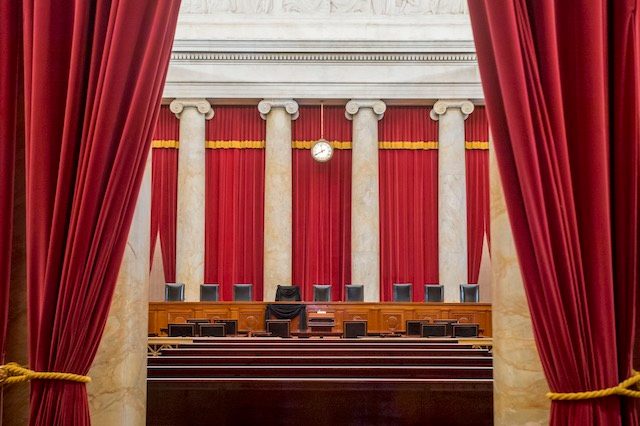SUMMARY
This is AI generated summarization, which may have errors. For context, always refer to the full article.

WASHINGTON DC, USA – The US Supreme Court resumed public hearings Monday, February 22, for the first time since the sudden death of conservative justice Antonin Scalia, which left the court evenly divided.
Scalia’s chair was vacant, draped with black wool crepe in keeping with a tradition dating back to 1873, as the remaining 8 justices took their seats.
Chief Justice John Roberts gave a moving tribute to “our man for all seasons.”
“We shall miss him immeasurably,” Roberts said.
“He authored 292 majority opinions on the court. He was also known on occasion to dissent.”
Scalia, the first Italian American to serve on the court, died on February 13 at age 79.
His death abruptly ended the conservatives’ 5-4 advantage on the high court, giving President Barack Obama an opportunity to tilt it in a more liberal direction.
But he faces stiff opposition from his Republican foes in both houses of Congress, which they control, over his potential nominee to fill the vacant seat on the court.
The tensions are only exacerbated by intense political polarization in an election year.
The court is now evenly divided between 4 justices appointed by Democratic presidents and 4 appointed by Republicans. If the court is split 4-4 on a case, the lower court’s ruling stands.
Among the cases before the court, some concern hot button issues ranging from abortion to immigration, contraception, affirmative action and unions.
Appointed by president Ronald Reagan in 1986, Scalia was a towering figure in conservative legal thought, an originalist who maintained the US Constitution’s meaning was fixed as of the time it was ratified in the 18th century.
His funeral took place Saturday, February 20, with Obama noticeably absent, though he did pay his respects the day before while Scalia’s body lay in repose in the Great Hall of the Supreme Court.
Scalia was a passionate defender of the death penalty and the right to bear arms, and a staunch opponent of abortion rights, gay rights and affirmative action to favor minority groups that have historically faced discrimination.
Pre-election nominee?
All eyes are now on who will potentially replace Scalia. The president nominates high court candidates, who require a Senate majority in order to be confirmed.
Senate Majority Leader Mitch McConnell has made it clear he doesn’t want a nominee until a new presidential administration is in place, in January 2017.
It would likely still take weeks or months after the inauguration for a president to clear his nominee through the Senate, meaning the court would be hobbled for about a year or more.
The leading Republican presidential candidates have backed McConnell.
Ted Cruz pointed to a “long tradition” of skipping Supreme Court nominations in election years, while Marco Rubio spoke of an 8-decade “precedent.” Both are senators.
Reagan nominee Anthony Kennedy was confirmed by the Senate in 1988, an election year, though the vacancy occurred the previous year and the Senate rejected the president’s first nominee, Robert Bork.
Obama has responded by affirming his intent to nominate a successor this year, stressing it was his constitutional duty to do so, and urging lawmakers to refrain from obstructing by principle.
Ironically, Obama’s Vice President Joe Biden pressed in 1992 for then president George H.W. Bush to wait until after the election to fill any Supreme Court vacancy.
“It is my view that if a Supreme Court justice resigns tomorrow or within the next several weeks or resigns at the end of the summer, President Bush should consider following the practice of a majority of his predecessors and not, and not name a nominee until after the November election is completed,” Biden said during a Senate floor speech in 1992 while serving as US senator from Delaware.
He also said the Senate Judiciary Committee, which reviews such nominations before sending them to the full Senate for a vote, “should seriously consider not scheduling confirmation hearings on the nomination until after the political campaign season is over.”
The comments are likely to come under heavy scrutiny as Obama prepares to nominate a successor to Scalia.
In order to get his nominee confirmed, the president, who is weighing potential candidates, could pick a legal mind with an impeccable record whose nominations to previous posts have been backed by both Republicans and Democrats.
Such is the case for Sri Srinivasan, placed by analysts at the top of Obama’s shortlist.
His nomination to serve as a judge on the US Court of Appeals for the DC Circuit in Washington – long seen as an incubator of sorts for future Supreme Court justices – was backed unanimously by the Senate.
If nominated, Srinivasan would be the first South Asian to serve on the high court. – Sébastien Blanc, AFP / Rappler.com
Add a comment
How does this make you feel?
There are no comments yet. Add your comment to start the conversation.